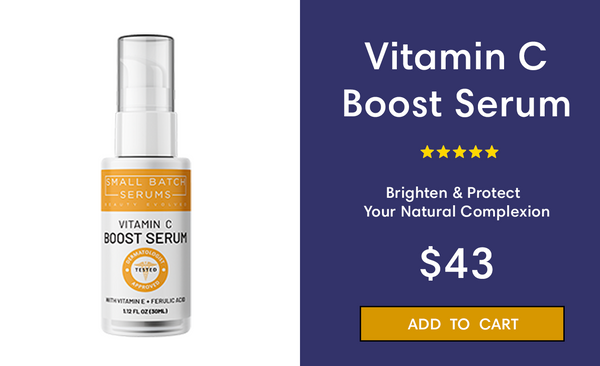A vitamin C serum deserves a spot in everyone’s skincare routine, regardless of skin type. Vitamin C is a multi-tasking powerhouse ingredient, and is one of the most effective tools for achieving a radiant, youthful complexion. While it may sound too good to be true, vitamin C has years of research to back it up.
Thinking of adding a vitamin C serum to your routine? Here’s everything you need to know before hitting the “add to cart” button.
What is Vitamin C Serum & How Does It Work?
If you're looking to enjoy the full benefits of vitamin C, you’ll want to use a vitamin C serum. A serum contains a high concentration of active ingredients (like vitamin C), so it’ll give you the most noticeable results.
Of course, it’s crucial that you pick a well-formulated vitamin C serum, which we’ll talk more about below. But first, let’s go over how a vitamin C serum works, and the many effects it can have on your complexion.
First and foremost, vitamin C is an antioxidant. This means it’s able to defend the skin against damaging free radicals that can contribute to signs of aging, including fine lines, wrinkles, sagging, and sun damage.
Vitamin C also has significant collagen boosting and protecting effects. Collagen is a protein found in the body that plays a major part in keeping the complexion looking youthful. As we age, levels of this protein decrease, which leads to lines and a loss of firmness and elasticity. Vitamin C protects the collagen that’s already present, while also boosting the body’s natural collagen production process. The result? Softened fine lines, improved elasticity, and a generally more youthful-looking complexion.
Lastly, vitamin C is one of the top ingredients for brightening the complexion and promoting a more even skin tone. It inhibits the production of melanin (which is responsible for discoloration), which in turn helps fade and prevent hyperpigmentation.
Common Ingredients in Vitamin C Serums
The star ingredient in a vitamin C serum is, of course, the vitamin C. Some commonly used forms of vitamin C include l-ascorbic acid, ascorbyl palmitate, ascorbic acid, and 3-0-ethyl ascorbic acid, among others. Some serums contain multiple forms of vitamin C, while others contain just one.
The best vitamin C serums are also commonly formulated with ferulic acid and vitamin E, both of which are beneficial ingredients for all skin types. Research shows that these ingredients stabilize and improve the efficacy of vitamin C. They also provide additional antioxidant benefits.
Choosing Vitamin C For Your Skin Type
Beyond keeping these key factors in mind, you need to make sure you choose a vitamin C serum that is suitable for your skin type. Here is what each skin type should look for in a vitamin C serum.
Dry Skin:
For the best results, those with dry skin will want to look for a vitamin C serum that is also made with hydrating ingredients. These will keep the skin feeling soft and supple, and will counteract any drying effects of the other active ingredients in the serum.
Hyaluronic acid (or sodium hyaluronate, which is a form of hyaluronic acid) and glycerin are particularly great ingredients to look out for. These humectants (both of which can be found in the Vitamin C Boost Serum) draw water into the skin and lock it in to promote a healthy, hydrated complexion. They also work great alongside vitamin C, and won’t interfere with its effects.
Sensitive Skin:
When it comes to finding a vitamin C serum that is suitable for sensitive skin, you need to ensure you avoid formulas made with common triggers. As mentioned above, serums made without fragrances are best for sensitive skin, as fragrances can cause irritation. You should also seek out formulas made without parabens, essential oils, dyes, or alpha hydroxy acids, as well as any other ingredients that you know can aggravate your skin.
Additionally, those with sensitive skin will benefit from formulas made with ingredients known to calm the skin. For example, the Vitamin C Boost Serum is made with licorice root extract and bisabolol. Both of these anti-inflammatory ingredients reduce inflammation and soothe the skin for a more comfortable complexion.
Acne-Prone Skin:
Vitamin C is great for acne-prone skin, as it can help lighten the appearance of post-inflammatory hyperpigmentation for a more even skin tone. However, finding a serum that won’t contribute to breakouts is crucial. We generally suggest looking for lightweight formulas made without ingredients known to clog pores, such as comedogenic oils (like avocado and coconut oils), algae extracts, and cocoa butter. Everyone reacts differently to certain ingredients, so if specific ingredients have caused breakouts in the past, you’ll want to make sure you avoid those, as well. .
Just like with sensitive skin types, it’s also important to avoid serums made with irritants that may aggravate current breakouts. Anyone with acne-prone skin will also benefit from formulas made with calming ingredients that can help soothe inflammation related to active acne.
Oily Skin:
The key to finding a good vitamin C serum for oily skin is looking for a product with a lightweight formula that won’t feel heavy on the skin. Typically, oil-free, water-based serums (like the Vitamin C Boost Serum) are ideal for oily skin, as they’ll have lighter consistencies.
Keep in mind that you can still use serums made with hydrators like hyaluronic acid and glycerin. These types of ingredients support the skin’s hydration levels (which is crucial for all skin types) without leaving any greasy residue on the skin. Rather, they’ll leave the skin feeling balanced, soft, and healthy.
What to Look for When Shopping for a Vitamin C Serum
A vitamin C serum is only as good as the formula that it’s included in, so there are some key factors you’ll want to keep in mind when looking for your perfect match.
First, you’ll want to find a serum with effective supporting ingredients. In addition to vitamin E and ferulic acid, we recommend looking for formulas made with hydrating ingredients, since vitamin C can cause mild dryness. Hydrating ingredients that are suitable for all skin types and work well alongside vitamin C include glycerin and sodium hyaluronate/hyaluronic acid.
You’ll also want to select a serum that’s offered in a container with an airless pump. Vitamin C can oxidize when exposed to air, so an airless pump ensures the formula stays potent.
It’s also best to steer clear of formulas that are made with fragrances, which can irritate the skin. This is especially important for those with sensitive skin.
If you’re looking for an effective, high-quality serum, ourVitamin C Boost Serum checks off all of these key requirements, and is made to be an excellent choice for all skin types. Beyond that, this formula is both dermatologist tested and approved, and is crafted with clean, scientifically-backed ingredients. This means you can feel confident adding this safe and expertly formulated serum to your routine!






